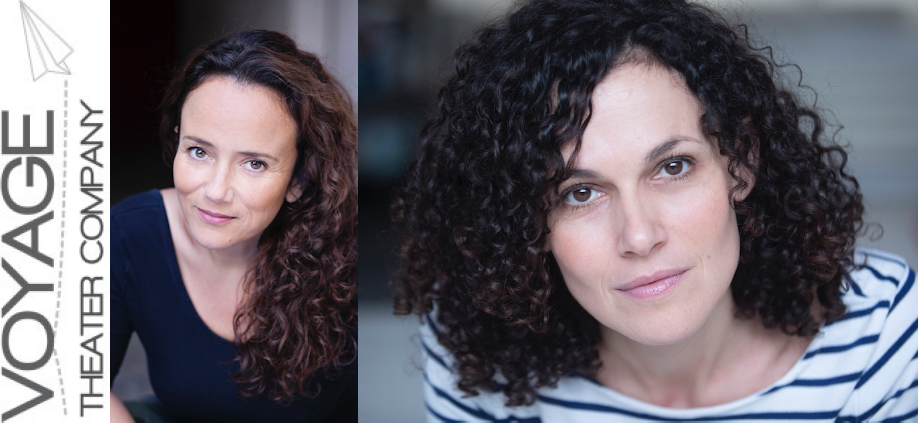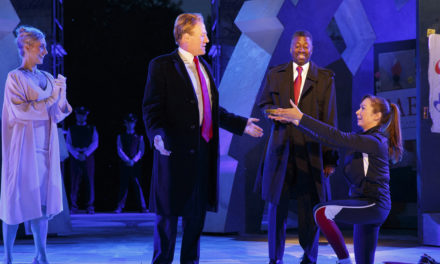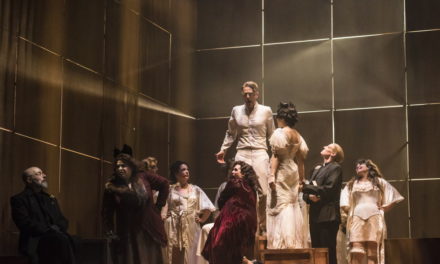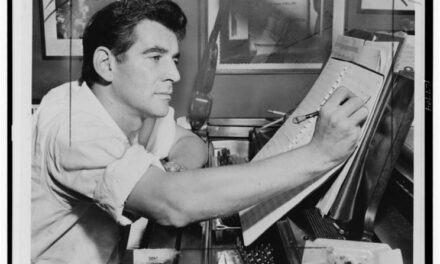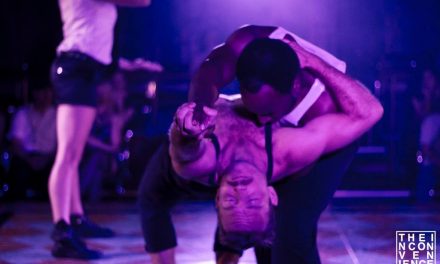Conversation with the two authors Charlotte Boimare and Magali Solignat, co-writers of the play, The Day My Father Killed Me.
The conversation (condensed and edited) has been conducted by translator and theater maker Amelia Parenteau on September 17, 2020, as part of the virtual staged reading of their play on October 22 by Voyage Theater Company.
About the play: The Day My Father Killed Me is based on the true story of a popular singer and radio DJ in Guadeloupe who murdered his 18-year-old son. Devised as a documentary theater work, the play offers a diverse narrative account of the crime through a chorus of voices reflecting the complexity of the familial conflict. Exploring fundamental themes of identity, power, and compassion in contemporary Caribbean society, this play emphasizes the universality of belonging through an intimate and intensely personal lens.
Amelia: How did each of you get your start in theater, and how did you begin working together?
Charlotte: We were in the same theater school in Paris, and we were frequently required to write short, five-minute scenes for each class. That was the first time we wrote something together, over 20 years ago, at this point.
Magali: 23 years.
Charlotte: So, we’d had this little experience of writing and performing a 5-minute scene together, and we had a ball. We had so much fun. We made something totally crazy. We were off the rails, and I remember we got great feedback, that it was funny, people laughed a lot. We were a little scandalous, a little incisive, a little provocative. That first experience really affected both of us.
Magali: After that, I returned to Guadeloupe, having finished my studies in Paris, and pregnant with my son. Charlotte asked if I’d like to write a two-hander with her. We decided we were going to tell the story of this piano teacher. So we both started writing —
Charlotte: I wanted to write a solo show, but I didn’t feel capable of writing it by myself, and I was thinking about it, wondering who I could ask. And I was friends with Magali, we had remained friends over the years, and I thought, of course, I should ask Magali. So I called her, and I said, “Can I come to Guadeloupe to write a two-woman show with you?” And she said, “Sure, come!” And I said, “Ok, I’ll be there in 2 weeks.” What’s great about working with Magali is that we’re both the same way, if we say we’re going to do something, then we do it right away. We’re just like, “Let’s go!”
Magali: Something that’s really nice about our work is it’s very respectful, in terms of time, hours, work. That’s always very present in our work plan. Also, the work I do with Charlotte is a type of continuity in my career. I really have the impression that I share one part of my career with Charlotte, and it’s kind of like these meetings, over the years, allows us to look into the future and know that whatever we undertake, we’re going to go all the way with it.
Charlotte: And that we’ll do it, as Magali says, with seriousness, and respect, while at the same time, we laugh all the time. We’ve found a natural balance [between humor and rigor] that allows us to really enjoy working together.
Amelia: That’s beautiful and so important. At what moment in your shared career did you come up with the idea for the story of The Day My Father Killed Me?
Magali: We wrote Touche-Moi, and after that, a friend of mine, Maryse, spoke to me about this story. And from that moment, I immediately needed to write about it, and I immediately started wondering how I was going to be able to do it, because I didn’t know how to integrate this story into my life without making something out of it. I didn’t want to just file it away as a simple human-interest story, or an anecdote, something that had happened. I recognized just how crippling it was, even my friend’s story becoming part of my own, living with that. And so, of course, I reached out to Charlotte.
Charlotte: Since I didn’t know Maryse, and I didn’t know the family personally, we agreed it would be interesting because I had a little more distance. It was less sensitive for me.
Magali: And so, we started writing. We went through many, many drafts.
Charlotte: As different versions. In the beginning, we didn’t dare; I think we tried to really shift the story, because we weren’t able to speak about it directly, to get under the characters’ skin, because despite it all, even without me knowing the family, once we started talking about it, it was too painful. We were afraid we might hurt the family; we were a little —
Magali: We weren’t settled. Which was our freedom, in writing, at that time. The moment of finding our freedom, our playing field, and what’s more, there was still this question that kept recurring about violence, because there’s a recognition of violence in Guadeloupe too, and that’s also something Charlotte and I discussed. We talked about how a monster is born. This question became central to this work, that was it: how do we become monsters?
Charlotte: Violence and how a monster is born, and also how all of society is complicit in it. And actually, how even we at our level, even if we say we’re already good, we think about things, at the end of the day we all more or less have this desire to know what’s happening at the neighbor’s house, little stories, a drama that happens —
Magali: Eavesdroppers, we’re interested in what’s not working —
Charlotte: Our voyeuristic side, right. And that’s what we wanted to explore.
Amelia: I can see that, through the chorus of voices you included in the play. You’ve created such intimacy through the voices of a large number of characters. Could you describe how you came up with this way of telling this story?
Magali: José Pliya was the one who gave us the idea for this form of writing, for this subject. He told us to draw up a sample group of society, and that it would be society’s point of view that delivered judgment on whether or not the convicted was guilty or innocent. And so I started thinking about my mother, my child and finding our characters that way, and I really felt like I was connected to my life that way, creating characters out of my real life, people I had met. Between the reality of the story, which we followed step by step to create the play, and this spectrum of people from the world, with aspects that could be adapted or completely extraordinary, but which were real —
Charlotte: Being actors ourselves, every time we’d come up with a character, we also worked a lot in improvisation, and out of those improvisations, there were bad ideas but there would also be great ideas, and those we would keep. Both of us spent a lot of time acting out the characters.
Magali: We did spend a ton of time writing, though. That has to be said.
Charlotte: We spent a lot of time, and we no longer know, we wouldn’t be able to tell who you wrote what, every word was deliberately and carefully selected and —
Magali: Every comma, as they say. Every comma, every period, every word, and sometimes, actually, it has to do with how the power of a turn of phrase can immediately instill a character’s motivation. And so, we take a ton of time there, in that pivotal moment. Then, when we’re finally both in agreement, we move on.
Amelia: It’s so satisfying to work in a partnership like that. You complete each other.
Magali: All the more so because I have complete confidence in Charlotte’s artistry. So when she says something’s good when she likes something, that gives me confidence, and that lets us advance, or not, but avoids wasting our time. We’re each other’s safeguards, at different points along the way, to go in the same direction.
Amelia: Could you talk about why it’s important to present this story at this moment, given our global context?
Magali: The role of the father is extremely important right now, as it pertains to Big Brother. Certain laws are obligatory, we’ve given all the power to the president in an unprecedented time, so it’s really the place of authority, the place of the father in young adult development.
Charlotte: How do you define yourself when you haven’t been recognized by your father?
Magali: Acknowledging that there are people for whom it will all work out.
Charlotte: Of course.
Magali: It’s not true for everyone who isn’t recognized by their father.
Charlotte: It’s really an open question, how do we define ourselves when one of our parents doesn’t recognize us? What is disequilibrium, it’s a question that shakes us up.
Magali: In any case, we realized our recurring themes are family ties, messages that are spoken inside the family informing the construction of an adolescent, a child, and also the pivotal passage between adolescence and adulthood. In this case, this character is looking for his father’s recognition. I think, above all, it’s a need for love for someone who’s missing it, and I think there’s no person on earth who doesn’t need it. It’s this need for love from someone who should give it to us without us having to ask. How can we survive that, how is it bearable —
Charlotte: And the inverse, we talked about that, too, when we started writing. In psychoanalysis, you have to kill the father to take your place as a man and exist. Symbolically killing the father, and in this case, it’s the father who kills the son. Because he doesn’t want to lose his place as an adolescent. He doesn’t want to accept his role as a father, he doesn’t want to be a man. He wants to stay in his completely adolescent world.
Amelia: Speaking of which, what news can you share about the trial in Guadeloupe?
Magali: So [the father] was brought to trial, [the son] Terence’s whole family on his mother’s side was there, then they came back a second time, from Canada, from Paris, from France, all over the world, to Guadeloupe. He was found guilty, and he appealed. So he’s been released from prison.
Charlotte: For the time being, that’s where it stands. Nothing else has happened.
Magali: Maryse, Terence’s mother, is reassured that he was found guilty. By now, she’s exhausted, because they’ll have to bring the whole family back again for the next trial, and live through the trial with the father, who is completely unpleasant, cruel, and odious.
Charlotte: It’s been seven years, this nightmare.
Magali: Yes, seven years. What’s doubly painful is not only is this child dead but after the press heard about it, after everyone caught wind of the story, that’s also what we found interesting because in Guadeloupe everyone had an opinion about the story. And I realized just how vicious we are, because even me, if I hadn’t known the family, I would have been just like everyone else.
Charlotte: From the things Magali told me, because Maryse in Guadeloupe tells lots of things to Magali, there were so many characters who seemed a little extreme, a little monstrous, but we’re actually not far from the truth, it’s not as exaggerated as you may think. There are really some horrible things that were said, and very real things in what we wrote.
Magali: It makes stories that take place in the Caribbean and in Guadeloupe universal. This story could take place anywhere.
Charlotte: It takes place there, but it could happen in any town.
Magali: It also makes the Caribbean language universal.
Amelia: Could you describe the production history of this play, as well as any other programmed presentations for the future?
Magali: The first staged reading took place at the SACD in November 2017. We received the Textes en Paroles Prize in 2017 and the Etc Caraïbe/SACD/Beaumarchais Prize in 2017, at the Francophonies in Limoges. We did a staged reading after that at the conservatory in Avignon, and another staged reading at the Théâtre des Halles the following year.
Charlotte: The Théâtre des Halles in Avignon. Coming up, we’re going to be in residence at the Théâtre des Halles in Avignon in autumn 2021. And we had a great meeting last week with a national theater in Toulon called Le Liberté, and we’re going to be in residence with them, as well. So, for the moment we have two wonderful partners. It’s very promising for what’s to come. And we have a wonderful director, Catherine Schaub.
Amelia: Anything else you’d like to add?
Magali: We’ve written another play together, called Maïwenn, 16 ans et demi. It’s been nominated for the Lycéens Prize, and we’re going to Guadeloupe next December to see if we’ve won.
Charlotte: We’ve also been selected by Textes en Paroles, which is an organization that promotes Caribbean authors, as one of their laureates.
Le Jour Où Mon Père M’a Tué, by Charlotte Boimare and Magali Solignat, translated by Amelia Parenteau, was commissioned by ACT (Actions Caribéennes Théâtrales), a project initiated by Stéphanie Bérard, in partnership with Siyaj Company, Guadeloupe, in collaboration with Frank Hentschker of the Martin E. Segal Theatre Center, The Graduate Center CUNY, New York and the Cultural Services of the French Embassy. The project was supported by the FACE Foundation.
This article was originally posted at FrenchCulture.org and has been reposted with permission. To read the original article, click here.
This post was written by the author in their personal capacity.The opinions expressed in this article are the author’s own and do not reflect the view of The Theatre Times, their staff or collaborators.
This post was written by Amelia Parenteau.
The views expressed here belong to the author and do not necessarily reflect our views and opinions.

